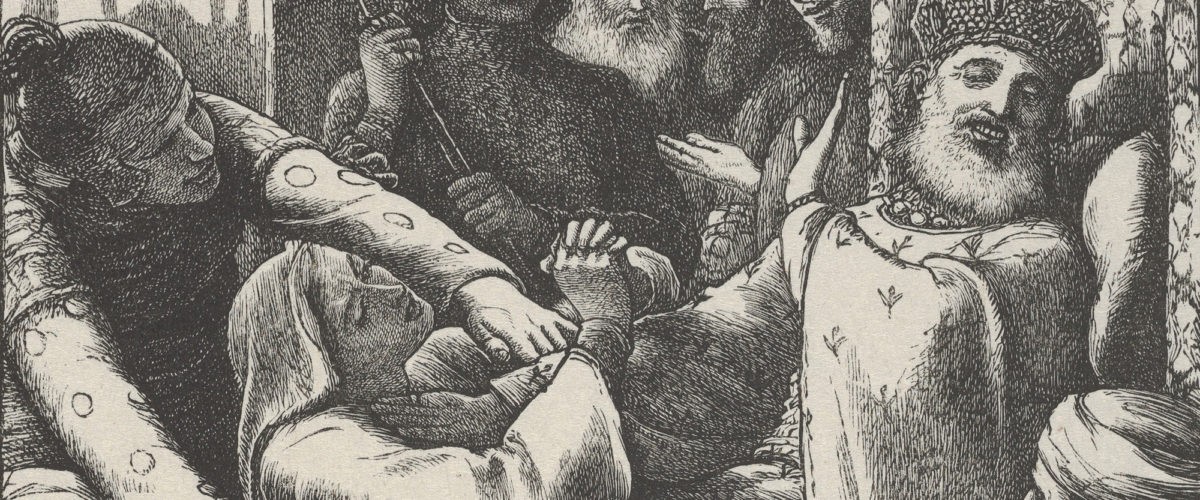On Palm Sunday in my Bible study class at First Baptist Church of Decatur, Ga., I was slated to teach this parable of Jesus. It is one of my favorites.
Then Jesus told them a parable about their need to pray always and not to lose heart. He said, “In a certain city there was a judge who neither feared God nor had respect for people. In that city there was a widow who kept coming to him and saying, ‘Grant me justice against my opponent.’ For a while he refused; but later he said to himself, ‘Though I have no fear of God and no respect for anyone, yet because this widow keeps bothering me, I will grant her justice, so that she may not wear me out by continually coming.’” And the Lord said, “Listen to what the unjust judge says. And will not God grant justice to his chosen ones who cry to him day and night? Will he delay long in helping them? I tell you, he will quickly grant justice to them. And yet, when the Son of Man comes, will he find faith on earth?”

David Gushee
I love this passage for many reasons. It highlights the centrality of justice both in the Jewish tradition and for Jesus himself, which is so important because many Christians still somehow miss this theme altogether.
The parable demonstrates that Jesus viscerally understands that the dispossessed and disinherited, those who face deeply harmful violations of justice, cry out day and night.
Their cries go up to God, as Jesus notes here. But such cries also go up to those who are supposed to be advancing justice in this unjust world, such as judges. Unfortunately, all too many judges “neither fear God nor have respect for people.” This is so relevant in our nation and world as to require little comment. We can just nod our heads and tell our stories.
The parable offers a good reminder that in the Hebrew Bible the work of justice focuses on protecting the rights of those who have little power and who are unable to defend themselves. I like to call this “justice from below” rather than above, and this is the justice legislated in the Hebrew Bible and emphasized here by Jesus. This helps us avoid importing authoritarian or libertarian understandings of justice into the Bible.
Jesus adds an encouraging but difficult claim after his story ends. He promises that God will grant justice to “his chosen ones who cry to him day and night.” Jesus also promises that justice will be quick, that God will not delay long in helping. And yet justice in this world is often nonexistent and certainly not quick, for Christ-followers and for many others. Think of how long the enslaved of this land, many of them believers in Jesus, cried out for justice.
“Hardly anything can shred faith more profoundly than the long-term experience of victimization and injustice.”
Jesus ends this parable with the enigmatic question of whether, when the Son of Man comes, he will find faith on earth. Scholars have debated what this means here. I think it means that Jesus recognizes that those who are denied justice often “lose heart” and even lose faith in God, or in the justice of God. We know this to be true. Hardly anything can shred faith more profoundly than the long-term experience of victimization and injustice.
The parable can be taught as having profound ethical implications. The point is not just that we should keep on praying and not lose heart, although Luke starts us there. I think we have here one of the clearest mandates in the New Testament for disciples to be about justice work in this world. One way justice is delivered rather than delayed is when Christians work to make that happen. And, if injustice causes loss of faith, justice work is an aspect of evangelism, not “just” ethics.
This is what I usually say about the parable of the unjust judge. But this week Luke 18:1-8 was to be taught on Palm Sunday. The lectionary readings for this day were drawn from Isaiah 50, Psalm 31, Philippians 2, and Mark 14-15. These texts are about the foreshadowed suffering of Jesus, his self-emptying love and his trial, torture and execution.
In bringing Luke 18 into contact with the Passion of Christ, I said this: What if we start by seeing Jesus himself in a role parallel to the victimized widow of Luke 18? Denied justice on this earth, like so many others and in identification with them, he cries out to God on the Cross, “My God, my God, why have you forsaken me?” His faith wavers as he himself is victimized by grotesque injustice. Jesus is among the disinherited of this earth, crushed by injustice at the hands of the very ones charged with advancing justice.
“Jesus is among the disinherited of this earth, crushed by injustice at the hands of the very ones charged with advancing justice.”
But there is more. The church historically has taught that Jesus bears and absorbs all the sins of the world, including sins of injustice, on the Cross. He is crushed by the weight of those sins. And yet three days later God raises him from the dead.
My takeaway at this moment is simply this: Christian ethics most certainly includes the work of justice, which must draw our passionate efforts until the end of time.
And yet, Christian faith is about more than our work of justice in this world. It is about God’s response to our injustice in Jesus Christ. It is about the great mystery of a crucified Savior, crushed by the weight of our sin, vindicated by God for the salvation of the world.
David P. Gushee is a leading Christian ethicist. He serves as Distinguished University Professor of Christian Ethics at Mercer University and is the past president of both The American Academy of Religion and The Society of Christian Ethics. He’s the author of Kingdom Ethics, After Evangelicalism, and Changing Our Mind: The Landmark Call for Inclusion of LGBTQ Christians. He and his wife, Jeanie, live in Atlanta. Learn more: davidpgushee.com or Facebook.
Related articles:
This Good Friday, I’ll be at the hanging tree | Opinion by Stephen Shoemaker
Prayer in the present chaos | Opinion by Molly Marshall


